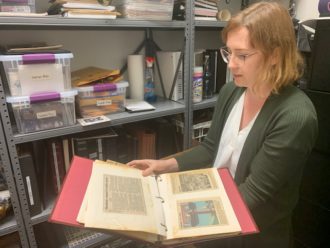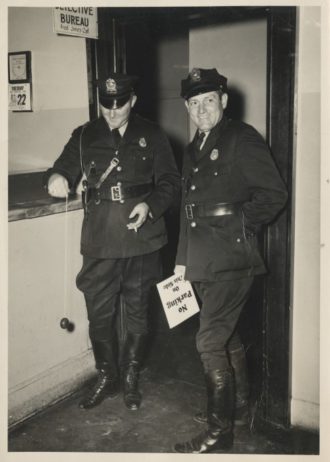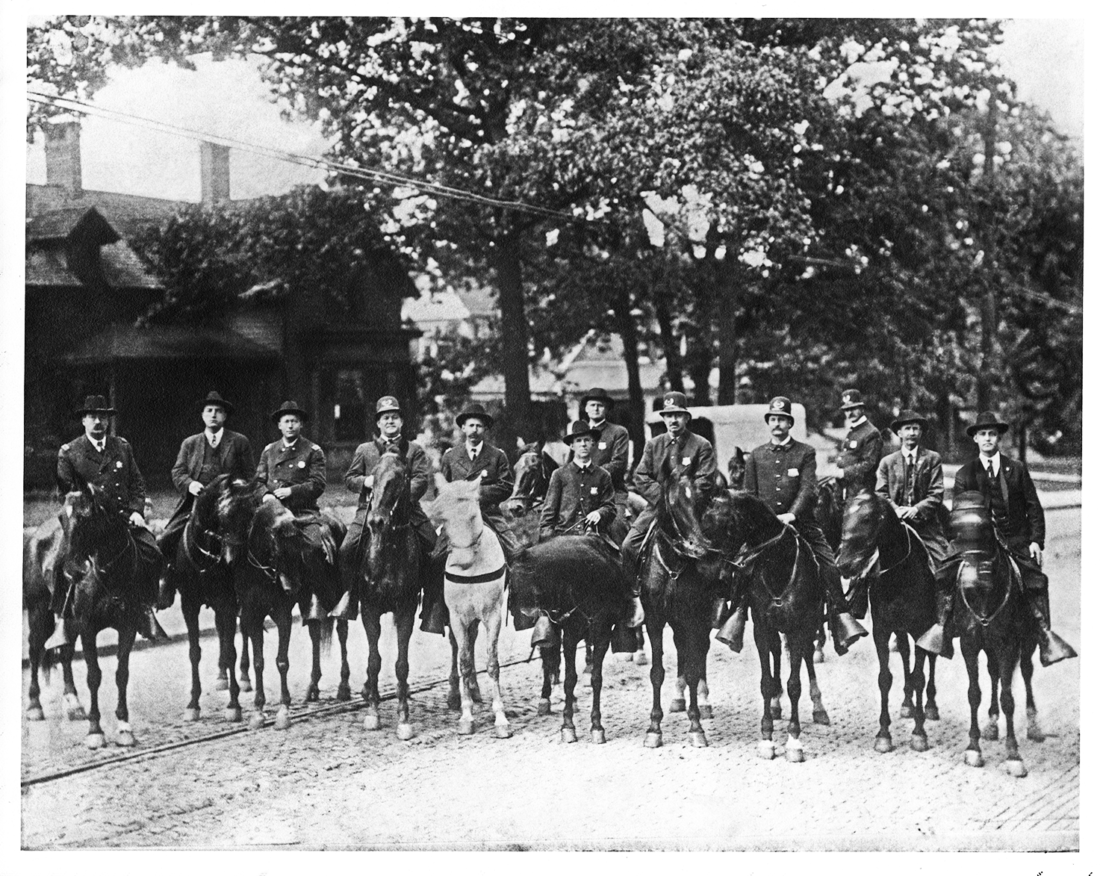With the Asheville Police Department’s 150th anniversary coming up in 2025, officials decided it would be a good time to look back at the department’s history. There was only one problem.
“When they were trying to find information, they were like, ‘Hey, we don’t really have a history put together,’” says Hannah Silberman, the APD’s accreditation manager.
In response, a six-member research committee, spearheaded by Jimmy Wingo, APD’s law enforcement technology specialist, and including Silberman was established in June 2023 to flesh out the department’s history, starting with its formation in 1875. The goal is to produce a 200-page book by next year. APD intends to get the final product in the hands of every living officer who has served the city, past and present.
A self-proclaimed “history nerd,” Silberman, who has held her position with APD since 2015, was the natural person to take the reins of the project. “I like to read old newspaper articles, I do my family genealogy,” she says. “I had unofficially started being the history person here. I just sort of ran with it.”
She’s approached the research in many different ways — reaching out to retired officers and their families, seeking input from the community, and gathering what little historic archives the department kept following building renovations in 1998. As a result, she has an office closet brimming with vintage uniforms and badges, photographs dating to 1904, newspaper clippings and more. And she has completed more than 70 pages of the manuscript for the book, taking the department’s story to the 1920s.
Now, she is looking for help from the public.
“There aren’t a lot of pictures or other items from the 1930s to the 1980s,” she says. “I have some, but it’s few and far between. So I’m really hoping to get the word out to people who had a relative, like their grandpa, who was a police officer. They might have pictures or old equipment or anything that they could share.”
Making history
Poring over old newspaper stories in the Asheville Citizen and the Asheville Times has been a delight for Silberman. The papers, which merged in 1991, covered the APD thoroughly throughout the late 19th and early 20th centuries in the colorful prose journalists tended to use in those days, she says.
“There’s so many awesome stories, you have no idea,” she says. “The old newspapers liked to publish the little funny stories, and it’s great. They were really into the politics of the department.”
And the politics in those early years could be intense and confusing because the police chief was elected by the public until civil service reforms in the 1930s made it an appointed position.

“Elections were every single year, and then it moved every two years, and so for the first 50 years of our department, there was a constant rotation of police chiefs,” Silberman says. “It makes it very hard to untangle.”
The department’s first official police chief was Ambrose Featherston, a saloon keeper who took the job in 1880. “Something I enjoy is that they penciled in ‘chief of police’ over ‘saloon keeper’ in the 1880 census,” Silberman says.
A 1900 story in The Asheville Register revealed another fascinating story about an Asheville police chief:
“While attempting to escape from the city prison Wednesday evening Joe McClatchy received blows at the hand of Chief of Police Lyerly which resulted in his death. The fatal encounter took place in the gloomy half light of the basement of the city hall, just in front of the dungeon door.”
First Black officers
Through newspaper accounts, Silberman discovered the story of George Greenlee, a Black private detective who frequently worked with APD in the early 20th century until his death in 1912. The department hired Greenlee to help solve robberies or track down murder suspects because he had contacts in the Black community that the all-white police force lacked.
“There are lots and lots of articles about him, and so I have a whole page on him in the book,” she says. “He gave a service to the community as a very skilled detective.”
One article she found referred to Greenlee as an Asheville police officer, an obvious mistake considering the department did not hire Black officers until 1946. That year, DeLaney A. Horne and Gilbert Sligh were added to the force after the idea was pushed by a group of citizens led by Eugene Smith, publisher of Asheville’s Black-owned newspaper The Southern News.
Silberman has been researching the lives and careers of the two men, knowing their pioneering efforts are worth celebrating in the book. She would love to get her hands on an original copy of a photo of the two officers The Asheville Times ran on April 4, 1946, their first day on duty.
Through Ancestry.com, she has found high school yearbook photos of Horne, who was a teacher and coach at all-Black Stephens-Lee High School before he joined the police force. “Then he quits the force in 1948, under strange circumstances,” she says. “I haven’t figured it out yet.”
Sligh retired as an officer on Nov. 24, 1962, due to a back injury sustained on the job and other health-related issues.
Full story
Old newspaper accounts also led Silberman to the story of the APD’s first female police officers. A February 1943 article in The State: A Weekly Survey of North Carolina, helped her fill in the details. The magazine was published out of Raleigh starting in the 1930s.

“In the 1940s, World War II absolutely decimated the [APD] staffing, because all the officers went to join the armed forces,” she explains. “So they hired female traffic cops to issue traffic tickets. They had full authority, but they didn’t give them weapons. There’s a lot of shaded sexism [in The State article], like, ‘The rough stuff will be left to the men.’ Eventually, they transitioned them to be school crossing guards, which is how they’re often referred to in the newspaper.”
Asheville would not have nontraffic women police officers until the 1970s. In 1979, the U.S. Justice Department ruled that the APD discriminated in its hiring practices when it failed to hire five women as officers between 1974 and 1977, according to contemporaneous reports in The Asheville Times.
The book will not shy away from such topics, Silberman says. Similarly, more recent history like the APD’s staffing crisis and local protests following the death of George Floyd likely will be addressed.
“I haven’t gotten there yet,” she says. “I’m sure we’ll just deal with it as truthfully as we can. And the same with all the history all around it. The story is what it is.”
‘Sense of belonging’
Rae Ferguson retired as an APD lieutenant in 2012 after 28 years of service. She now works part time in the accreditation department and serves on the committee putting together the book.
As a longtime department member, she hopes to provide some historical perspective “if I can remember it,” she says with a laugh.
In addition to helping Silberman with research and editing, she has been working with retired officers who want to share items from their personal collections or come to the department to have their pictures taken for the book.
The retired officers, some of whom have died since she talked to them, seem excited about the project.
“When I came along [in the 1980s], I didn’t know anything about the history of the department because nobody kept up with that stuff back then,” she says. “I always was curious as to how did we get to where we are? What were the changes and the processes and the goals and those kinds of things. When you have that historical perspective, and you see how the process has gone over the years, it gives you interest in wanting to be a part of something that’s bigger than you. It gives you a sense of ownership and a sense of belonging.”




The first Black police officer in Asheville was Henry Saxton, appointed on May 11, 1883. This information is found in the meeting minutes of the Asheville Board of Aldermen.